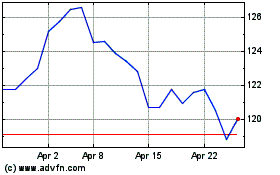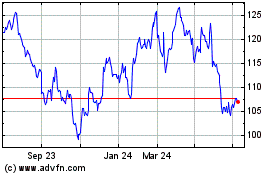By Juliet Chung and Margot Patrick
Investor Bill Hwang set off a storm in the stock market in March
when his firm, Archegos Capital Management, and its banks, began
liquidating huge positions in blue-chip companies, according to
people familiar with the transactions. The sales sent individual
stocks swooning and have left at least three banks with major
damage. Credit Suisse said on April 6 that it would take a $4.7
billion hit because of the meltdown.
What is Archegos Capital?
Archegos is the family investment vehicle owned by Mr. Hwang, a
former protégé of hedge-fund titan Julian Robertson. Mr. Hwang was
a so-called Tiger cub, an offshoot of Mr. Robertson's Tiger
Management. Mr. Hwang founded Tiger Asia in 2001. Based in New
York, it went on to become one of the biggest Asia-focused hedge
funds, running more than $5 billion at its peak. In 2008, it was
one of a swath of funds that suffered losses related to the soaring
share price of Volkswagen AG of Germany
In 2012, Tiger Asia said it planned to hand money back to
investors. Later that year, the firm pleaded guilty to a criminal
fraud charge for using inside information from investment banks to
profit on securities trades. Mr. Hwang and Tiger Asia paid $44
million to settle a related civil lawsuit, The Wall Street Journal
reported at the time.
Mr. Hwang turned Tiger Asia into his family office and renamed
it Archegos, according to its website.
"This is a challenging time for the family office of Archegos
Capital Management, our partners and employees. All plans are being
discussed as Mr. Hwang and the team determine the best path
forward," a company spokeswoman said in a written statement on
March 29.
What did Archegos invest in?
Archegos describes itself as focused on public stocks in the
U.S., China, Japan, South Korea and Europe. In recent months,
traders say, it played a part in the strong rally -- and subsequent
fall -- in shares of ViacomCBS Inc., Discovery Inc. Farfetch Ltd.
and New York-listed Chinese tutoring company GSX Techedu Inc.,
Tencent Music Entertainment Group, Baidu Inc. and IQIYI Inc.
How big was Archegos?
Archegos is estimated to have managed about $10 billion of its
own money, according to people familiar with the fund. But its
total positions that were unwound Thursday and Friday approached
$30 billion thanks to leverage Archegos obtained from banks. The
firm isn't known to have managed outside capital.
What are swaps and why did Archegos use them?
Archegos took big, concentrated positions in companies and held
some positions via something called "total return swaps." Those are
contracts brokered by Wall Street banks that allow a user to take
on the profits and losses of a portfolio of stocks or other assets
in exchange for a fee.
Swaps allow investors to take huge positions while posting
limited funds up front, in essence borrowing from the bank. The use
of swaps allowed Mr. Hwang to maintain his anonymity, even as
Archegos was estimated to have had exposure to the economics of
more than 10% of multiple companies' shares. Investors holding more
than 10% of a company's securities are deemed to be company
insiders and are subject to additional regulations around
disclosures and profits.
Swaps are common and have been around for a long time. They are
also controversial. Long Term Capital Management, a hedge fund
advised by two Nobel laureates that nearly brought down Wall Street
in the late 1990s, used swaps. Warren Buffett wrote about the risks
of swaps in his 2003 letter to investors.
How did leverage play a role?
Swaps can amplify the size of an investment in a stock by
allowing the investor to put up only limited funds up front. When
the underlying investments went the wrong way, the banks sold the
shares they held on behalf of the investor. This selling reinforces
the drop in the shares, which helps explain why the stocks that
Archegos had invested in fell so sharply.
What prompted the selloff?
Mr. Hwang's strategy began backfiring in recent weeks, as the
stock price of companies in which Archegos had significant
exposure, including China internet-search giant Baidu and Farfetch,
began to sell off. Baidu's stock price rose sharply in February,
but by mid-March its shares had dropped more than 20% from its
highs.
ViacomCBS on March 22 announced a sale of common stock, which
put further stress on Archegos, said people familiar with the
matter, with news of the deal sparking a slide in the shares and
adding to Archegos's mounting losses. The fund by that time had
started selling some of its position in ViacomCBS to try to offset
losses, adding to pressure on the stock.
But once the stock prices started to fall, Archegos's banks
started selling huge chunks of shares in the market in what are
known as block trades.
What is a block trade?
A block trade is the sale of a huge chunk of a company's shares.
These trades are often done at a discount to the current share
price because it is harder to find a buyer for a large quantity of
something than for a tiny piece.
What is a prime broker?
A prime broker is the part of a Wall Street bank that services
hedge funds. Prime brokers help hedge funds make trades and lend
them capital in the form of margin lending. Archegos used at least
half a dozen prime brokers, including Credit Suisse Group AG, UBS
Group AG, Goldman Sachs Group Inc., Morgan Stanley, Deutsche Bank
AG and Nomura Holdings Inc.
Who got hurt from Archegos?
Credit Suisse said it will take a $4.7 billion hit and two top
executives will leave their roles. Nomura warned investors of a $2
billion loss. Mitsubishi UFJ Financial Group Inc. of Japan said it
could lose $300 million from its exposure to a U.S. client, which a
person familiar with the matter said was Archegos.
Deutsche Bank said it has sold off its exposure and will emerge
unscathed.
Goldman Sachs and Morgan Stanley were quick to move large blocks
of assets before other large banks that traded with Archegos
Capital Management, as the scale of the hedge fund's losses became
apparent, according to people with knowledge of the transactions.
The strategy helped limit the U.S. firms' losses in March's epic
stock liquidation, they said.
How do you pronounce 'Archegos'?
The name comes from the ancient Greek word for leader. In Greek,
the word is pronounced "Ar-Khee-Gos" or "Ar-Khay-Gos." It was used
in the New Testament in reference to Jesus. Mr. Hwang is a devout
Christian.
Write to Juliet Chung at juliet.chung@wsj.com and Margot Patrick
at margot.patrick@wsj.com
(END) Dow Jones Newswires
April 06, 2021 04:40 ET (08:40 GMT)
Copyright (c) 2021 Dow Jones & Company, Inc.
Volkswagen (TG:VOW3)
Historical Stock Chart
From Mar 2024 to Apr 2024

Volkswagen (TG:VOW3)
Historical Stock Chart
From Apr 2023 to Apr 2024
